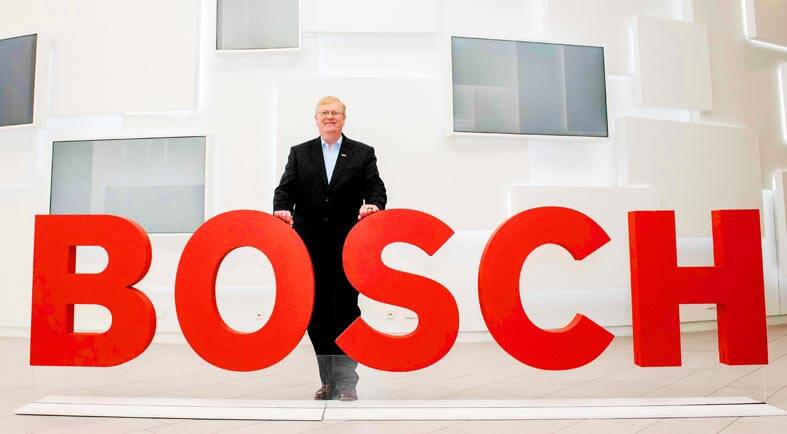The US Department of Commerce on Friday said that it had reached a preliminary deal with German auto supplier Bosch for up to US$225 million in subsidies to build silicon carbide (SiC) power semiconductors, a key component in electric vehicles (EVs), in California.
The department said the funding would support Bosch’s planned US$1.9 billion investment to transform its manufacturing facility in Roseville, California for production of SiC power semiconductors. It is also offering Bosch approximately US$350 million in proposed government loans for the project.
The department is tapping the US$52.7 billion fund, approved in 2022, to subsidize US semiconductor production and research. Officials have been racing to finalize terms for major loans in the weeks before President-elect Donald Trump takes office.

Photo: AFP
Bosch expects to produce its first chips on 200mm wafers in its Roseville facility starting in 2026. SiC chips are key components for the automotive, telecommunications and defense industries. They utilize less energy and are critical for boosting the efficiency of EV driving and charging, it said.
Last year, Bosch acquired key assets of California-based TSI Semiconductors and said producing the chip would “be heavily dependent on federal funding opportunities.”
Like other automotive manufacturers, Bosch was hit hard by disruptions to semiconductor production in Asia, which were exacerbated by the COVID-19 pandemic.
In October, the department reached a preliminary agreement with Wolfspeed for US$750 million in grants for its new SiC wafer manufacturing plant facility in North Carolina, it said.
When the Bosch facility reaches full capacity, the project could comprise more than 40 percent of all US-based SiC device manufacturing capacity, it added.
“The Roseville investment enables Bosch to locally produce silicon carbide semiconductors, supporting US consumers on the path to electrification,” Bosch North America president Paul Thomas said in a statement.
The award to Bosch would allow them to build “essential components for advances in clean mobility, electric vehicles and other clean energy technology,” said US Representative Doris Matsui, a California Democrat who helped write the 2022 law.

Hon Hai Precision Industry Co (鴻海精密) yesterday said that its research institute has launched its first advanced artificial intelligence (AI) large language model (LLM) using traditional Chinese, with technology assistance from Nvidia Corp. Hon Hai, also known as Foxconn Technology Group (富士康科技集團), said the LLM, FoxBrain, is expected to improve its data analysis capabilities for smart manufacturing, and electric vehicle and smart city development. An LLM is a type of AI trained on vast amounts of text data and uses deep learning techniques, particularly neural networks, to process and generate language. They are essential for building and improving AI-powered servers. Nvidia provided assistance

DOMESTIC SUPPLY: The probe comes as Donald Trump has called for the repeal of the US$52.7 billion CHIPS and Science Act, which the US Congress passed in 2022 The Office of the US Trade Representative is to hold a hearing tomorrow into older Chinese-made “legacy” semiconductors that could heap more US tariffs on chips from China that power everyday goods from cars to washing machines to telecoms equipment. The probe, which began during former US president Joe Biden’s tenure in December last year, aims to protect US and other semiconductor producers from China’s massive state-driven buildup of domestic chip supply. A 50 percent US tariff on Chinese semiconductors began on Jan. 1. Legacy chips use older manufacturing processes introduced more than a decade ago and are often far simpler than

STILL HOPEFUL: Delayed payment of NT$5.35 billion from an Indian server client sent its earnings plunging last year, but the firm expects a gradual pickup ahead Asustek Computer Inc (華碩), the world’s No. 5 PC vendor, yesterday reported an 87 percent slump in net profit for last year, dragged by a massive overdue payment from an Indian cloud service provider. The Indian customer has delayed payment totaling NT$5.35 billion (US$162.7 million), Asustek chief financial officer Nick Wu (吳長榮) told an online earnings conference. Asustek shipped servers to India between April and June last year. The customer told Asustek that it is launching multiple fundraising projects and expected to repay the debt in the short term, Wu said. The Indian customer accounted for less than 10 percent to Asustek’s

Gasoline and diesel prices this week are to decrease NT$0.5 and NT$1 per liter respectively as international crude prices continued to fall last week, CPC Corp, Taiwan (CPC, 台灣中油) and Formosa Petrochemical Corp (台塑石化) said yesterday. Effective today, gasoline prices at CPC and Formosa stations are to decrease to NT$29.2, NT$30.7 and NT$32.7 per liter for 92, 95 and 98-octane unleaded gasoline respectively, while premium diesel is to cost NT$27.9 per liter at CPC stations and NT$27.7 at Formosa pumps, the companies said in separate statements. Global crude oil prices dropped last week after the eight OPEC+ members said they would